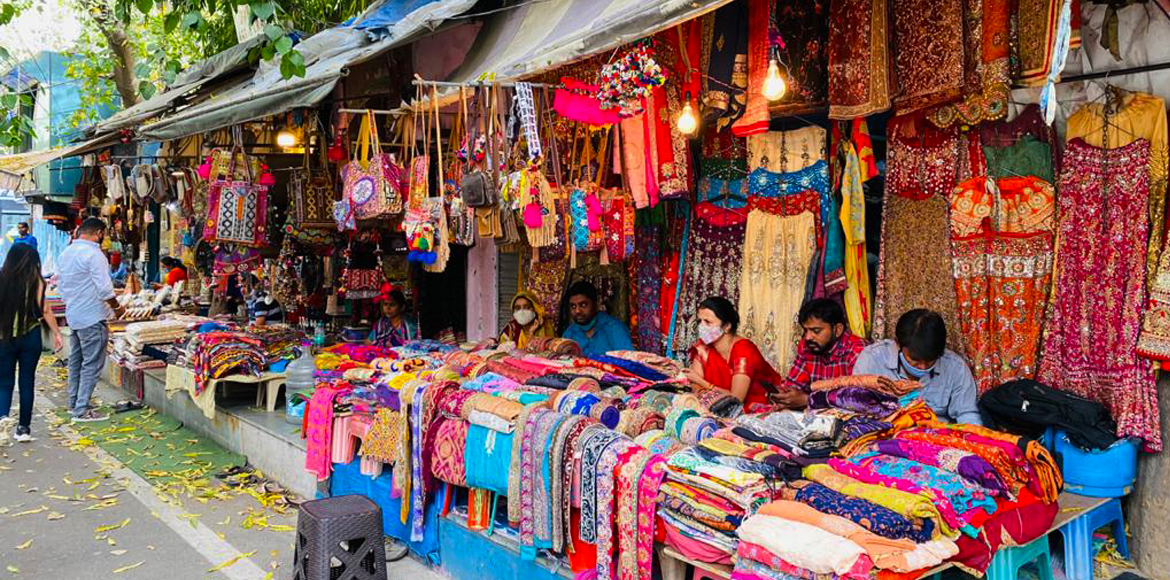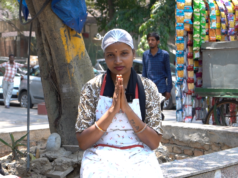“I am a very strong woman and can give any man in this market equal competition because I don’t lack zeal. However, what I do lack is support to stand up to officials who misuse their uniform and exploit us.”
For the longest time, street vendors and their presence in public spaces has been projected as illegal and unwanted. This could be attributed to absence of a law specifically pertaining to street vendors and their welfare. It was only in 2014 that a national legislation named “The Street Vendors (Protection of Livelihood and Regulation of Street Vending) Act” was notified. But, the awareness of the same still remains questionable. Street vendors as a community are poorly educated and have few resources at their disposal. This makes them more likely to be exploited by those in powerful positions.
The situation is worsened when one’s gender identity adds to their vulnerability and it is an entirely different ball game when a ravaging pandemic is underway. According to a UN report, women who are poor and marginalised are more likely to lose their livelihood during a pandemic since they typically earn less than men and have even lesser savings. The report also states that the pandemic would push more women into extreme poverty than men. From earlier experience of the Ebola outbreak, it has been seen that men and their economic activity are quick to rebound but it took longer for women to escape the cycle. Not just economically, even socially women have to bear the brunt when they are burdened with unpaid labour at home and more prone to domestic violence during these times. In this article, we look at Women of Janpath, who were vocal about the challenges faced by them while vending during the past year.
In March 2021 , Centre for Civil Society conducted a study to understand the impact of coronavirus on the lives of women vendors. We interviewed women in Delhi and Jaipur. They were asked to share their stories with us for an insight into their lives over the past year. The appalling theme that bound all 40 women was blatant violations of law by police and local authorities.
“Our items being seized is a common occurrence. We need to pay to get our own goods back.”
Section 19 of the Street Vendors Act, 2014, permits seizure only in cases where the vendor has failed to comply with eviction or relocation orders after the notice period of 30 days has expired. Following which, the vendor must be provided with a list of goods being seized, duly signed by the designated person of the local authority.
In our interviews we observed that seizure was often used as an extortion tactic by the local authorities. The authorities do not comply with the Act and seize goods illegally, and violate the rights of the vendors under the Act. Moreover, for the vendors to have a thriving business, the most basic requirement is access to goods but the practice of undue seizure of goods interrupts this access. It has instilled a fear amongst these vendors, which makes them run and hide with their goods as soon as they hear the police and local authorities approaching the market. This tends to disadvantage women who are single handedly working at their stalls. Post seizure, vendors are made to run from pillar to post to reacquire their goods. This results in loss of precious time and money, which can again be a stumbling block for women for various reasons including safety concerns.
“NDMC charges us wrongly if we don’t play by their rules.”
Arbitrary penalty is another weapon in the hands of the local authority who often charge and fine the street vendors excessive amounts. The Street Vendors Act, 2014 under Section 28 provides for fine upto two thousand rupees only. This section, however, empowers the local authority to determine the amount to be charged. This leaves scope for arbitrary penalties and vendors being financially abused.
Many women shared that they were compelled to pay a hefty amount just to reclaim their goods or carry on their business without interruptions. These women informed us that if they did not do as the officers said, they were given a challan for upto Rs 4000 for disobeying them. Even if vendors were stating facts, the officers construed it as misbehavior and in return fined them. This fear of losing their place of vending, goods and other such possibilities make the vendors pay unreasonable amounts to the authorities without questioning them or fighting back.
Women street vendors not just have to deal with the usual issues related to their line of business such as low income and lack of social and legal protection, but also have to suffer additional hardships owing to their gender. They face problems of low access to sanitation and health facilities. They face safety issues such as theft and sexual harassment. They often have to play multiple roles in their personal and professional life, adding to their distress . They do not get the required support from the systems in place.
The possible solutions would firstly include collating more sex disaggregated data through studies on women vendors to help unearth and recognise challenges exclusive to women. This will help in bringing to light issues which are often overlooked or not given due weightage because they impact a minority of the population. The subsequent action would be bringing in suitable policy changes and amendments to the Street Vendors Act, 2014. A suggestion would be introducing penalties for authorities if they are found harassing the vendors. A higher penalty can be charged if the harassment is directed at a woman. This would be an effective deterrent in reducing the cases of undue seizure, illegal eviction and arbitrary penalties.
The problem could also be resolved if women are able to access an increasing number of platforms for engaging and participating in discussion concerning them and their welfare. It will be insightful to study if Town Vending Committees across states are complying with the requirement of women reservations. If yes, whether the same is serving its purpose of empowering women by giving them a voice or if it merely serves as tokenism. Because till the time women’s opinions are not heard, the problem will continue to persist.
Read more: It’s time for Police Reforms in India
Post Disclaimer
The opinions expressed in this essay are those of the authors. They do not purport to reflect the opinions or views of CCS.






